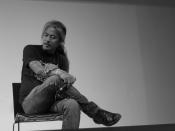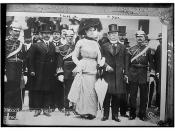The theme of cannibalism was most prevalent during the age of Exploration. Marco Polo, Sir John Mandeville, Christopher Columbus, and Bernal Diaz Del Castillo all make mention of cannibalism in their respective travel writings. There is a specific reason why this theme appeared predominantly during this period of time. The newly discovered land was presented as being full of natural resources. The presence of cannibalism labeled the natives as fierce, aggressive, wild, and barbaric. When cannibalism was accounted for by the religion of the natives, it gave the Europeans a reason to convert them to Christianity while harvesting the natural resources. The writers that described the newly discovered lands used the presence of cannibalism as a justification for the Europeans to conquer and occupy the land for commercial profit.
Marco Polo traveled to the islands of Zipangu (Japan) and dictated his account while he was imprisoned 3 years later.
The fact that he did not directly write down his observations, diminishes the accuracy of the report and therefore parts could be exaggerated and/or completely fictitious. Polo began by describing the inhabitants of Zipangu by stating that they worship idols out of tradition. Directly after establishing that the inhabitants worship idols, Polo stated that
"the reader should, however, be informed that the idolatrous inhabitants of these islands, when they seize the person of an enemy who has not the means of effecting his ransom for money, invite to their house all their relations and friends. Putting their prisoner to death they cook and eat the body, in a convivial manner, asserting that human flesh surpasses every other in the excellence of its flavor (61)."
This quote shows that cannibalism was widely accepted by the natives. Marco Polo stated that this is something that "the reader should ...be informed..." of and...


